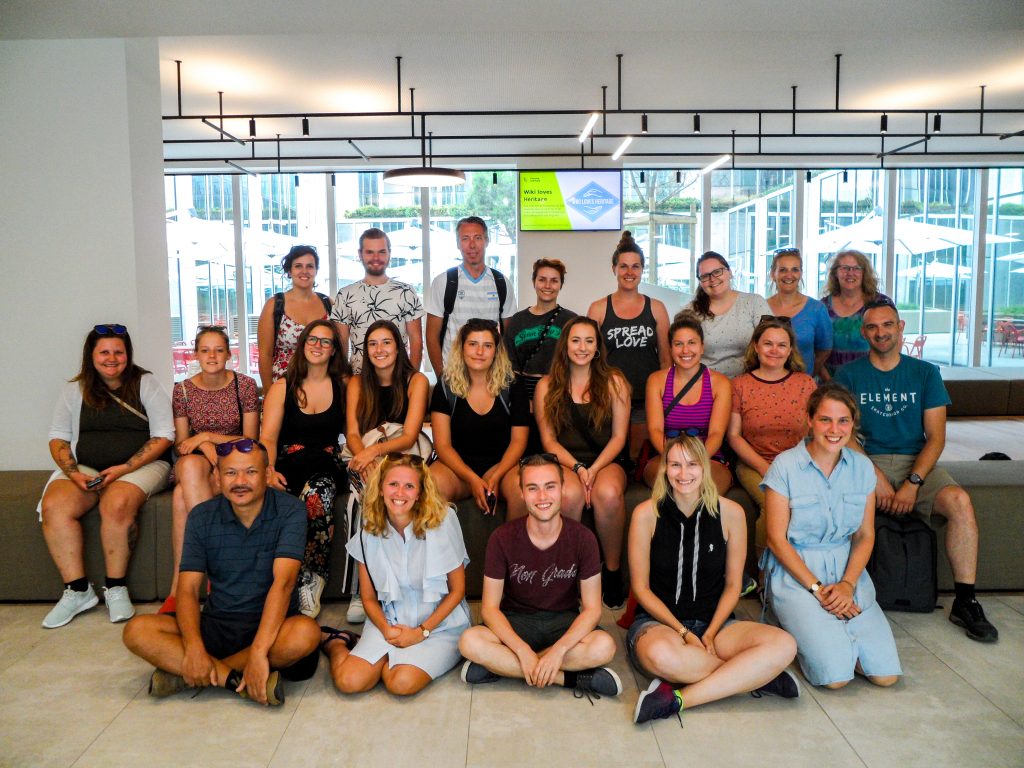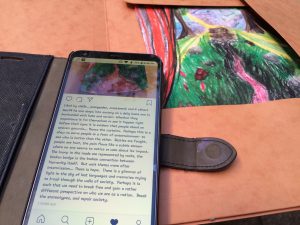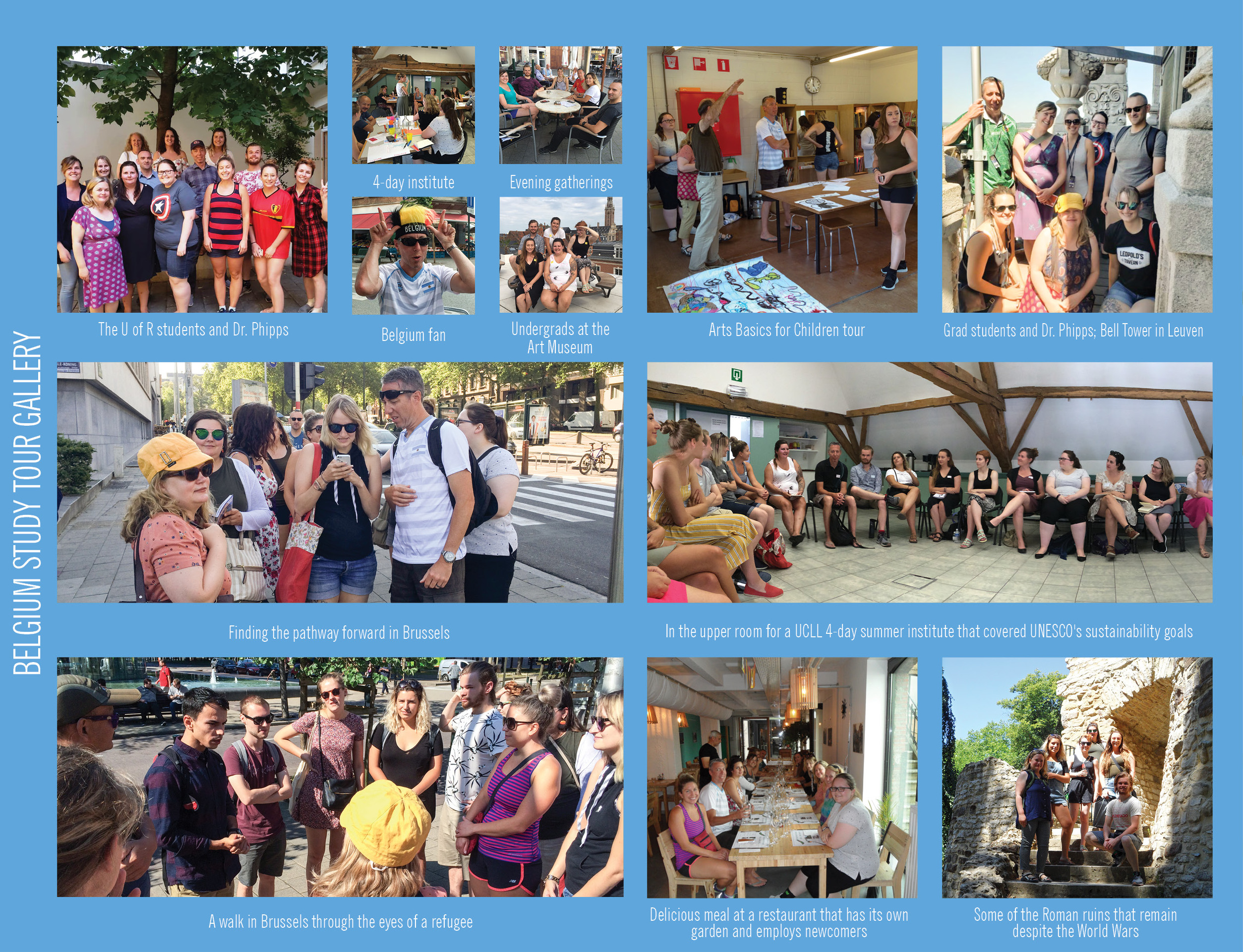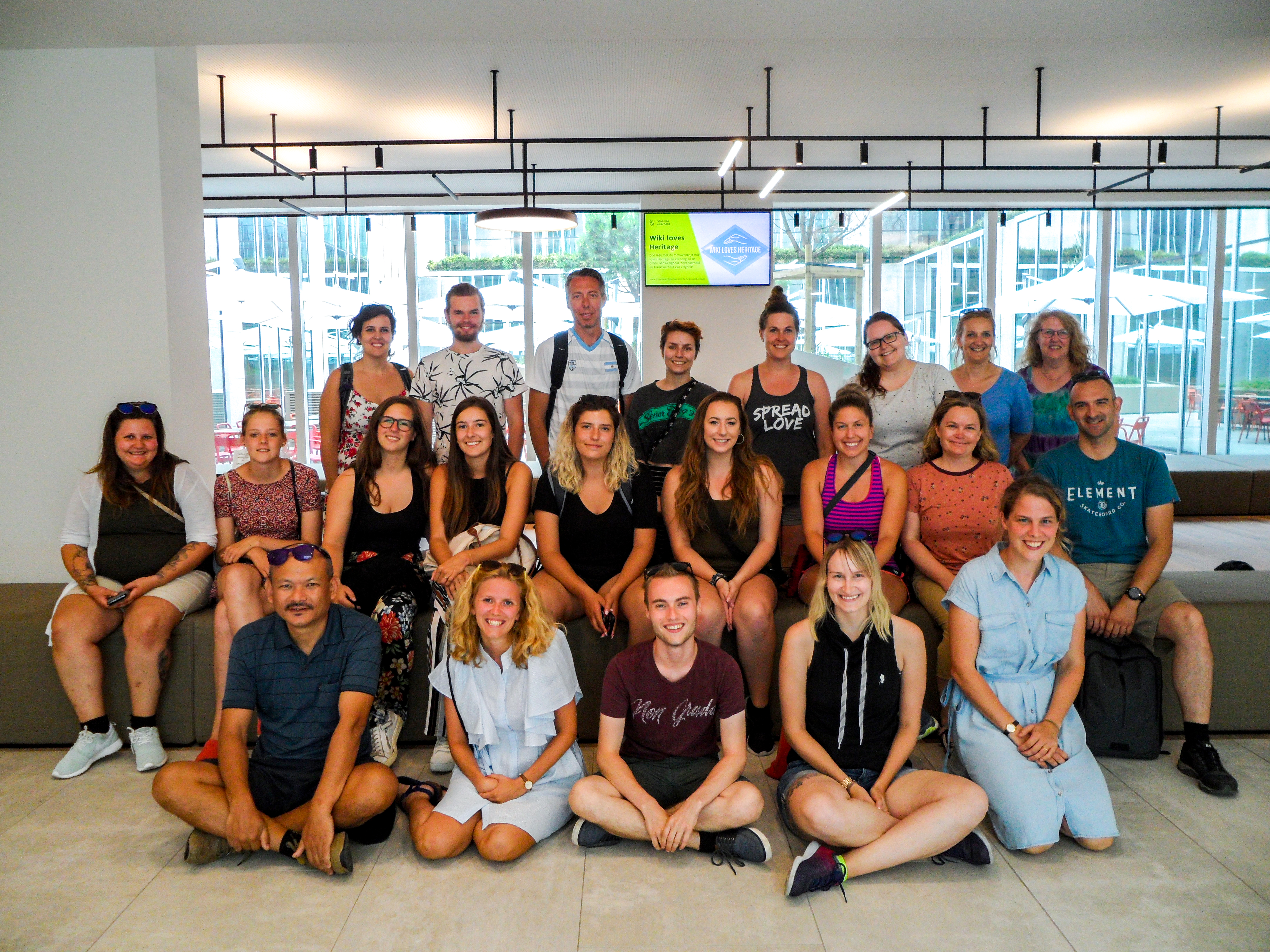
In July, five B.Ed. students, eight M.Ed. students, and one professor boarded international flights and converged in Belgium for a 10-day course exploring the theme of Social Justice and Globalization from an Educational Perspective. Students spent time in Leuven and Brussels for the course. Leuven is a university city in the Flanders Region, a region established mainly along ethnolinguistic lines. In Leuven, the dominant language spoken is Dutch (Flemish), and in Brussels, just a 20 minute train ride away, French and Dutch are spoken. Brussels is the capital city of Flanders, Belgium, and Europe. Belgium has three official languages, Dutch, French, and German. Belgium students learn, as part of their core curriculum, four or five languages. All of the UCLL students in the summer institute spoke fluent English as well. Fittingly, in this multilingual context, the U of R course was offered in both of Canada’s official languages: French and English, and students could use any language of choice for their assignments.
Dr. Heather Phipps, Assistant professor in the Bac program, spent many hours over the past two years organizing the course in partnership with the UC Leuven-Limburg (UCLL) University colleagues. She says, “We aimed to connect students internationally in a bilingual course that focused on global citizenship. As a language education professor interested in social justice, the whole experience was both rewarding and transformative, from planning the course to travelling with the students in Belgium.”
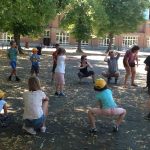 For undergrad students, the experience included volunteering for one full day in a summer language camp for young Flemish-speaking children who were learning French and English. Dr. Phipps says, “It was a very memorable day as the students worked alongside camp monitors from Italy and Turkey who spoke many languages. The students gained confidence through this experience and also made new international friends!”
For undergrad students, the experience included volunteering for one full day in a summer language camp for young Flemish-speaking children who were learning French and English. Dr. Phipps says, “It was a very memorable day as the students worked alongside camp monitors from Italy and Turkey who spoke many languages. The students gained confidence through this experience and also made new international friends!”
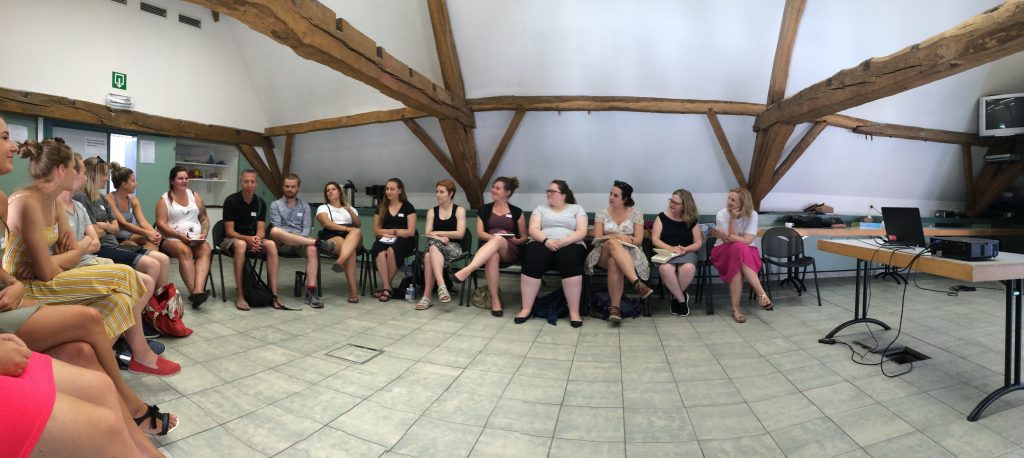 As part of the course, the University of Regina students joined with five undergraduate students from UCLL and a teacher educator from Bhutan for a 4-day institute on global citizenship, which explored UNESCO’s key concepts for a sustainable future, and was facilitated by UCLL’s Katrien Goosens and Leen Alearts. This diverse community of learners and educators generated international and even intergenerational perspectives on current global issues. Ashley Churko, a teacher working in French and a graduate student, found the diversity of perspectives a highlight of her time in Belgium. She says, “The class was not simply a master’s class, but was combined with undergrads as well. I found that the undergrads from both the University of Regina and those we connected with from Leuven gave very interesting insights and perspectives… I very much appreciated the mixture of people that we had in our group as it always led to fascinating conversations.” Erika Baldo, also a teacher working in French and a graduate student says, “I thoroughly enjoyed this cultural, educational, and bilingual experience. In addition, I appreciated meeting wonderful people and making new friends.”
As part of the course, the University of Regina students joined with five undergraduate students from UCLL and a teacher educator from Bhutan for a 4-day institute on global citizenship, which explored UNESCO’s key concepts for a sustainable future, and was facilitated by UCLL’s Katrien Goosens and Leen Alearts. This diverse community of learners and educators generated international and even intergenerational perspectives on current global issues. Ashley Churko, a teacher working in French and a graduate student, found the diversity of perspectives a highlight of her time in Belgium. She says, “The class was not simply a master’s class, but was combined with undergrads as well. I found that the undergrads from both the University of Regina and those we connected with from Leuven gave very interesting insights and perspectives… I very much appreciated the mixture of people that we had in our group as it always led to fascinating conversations.” Erika Baldo, also a teacher working in French and a graduate student says, “I thoroughly enjoyed this cultural, educational, and bilingual experience. In addition, I appreciated meeting wonderful people and making new friends.”
Leaving one’s country, one’s comfort zone, and exploring another country takes courage, requiring one to meet new people, and navigate new cities and multilingual contexts. There were many ‘firsts’: for some students this was the first trip overseas and for many of the students, the tour was their first time staying in International Youth Hostels. Discomforts were met with courage by the students. For instance, one of the Canadian student’s luggage didn’t arrive with her and she only received it when she got back to Canada. And, two students spent a night sleeping on the floor of an airport due to delayed flights. Despite these difficulties, everyone remained in good spirits.
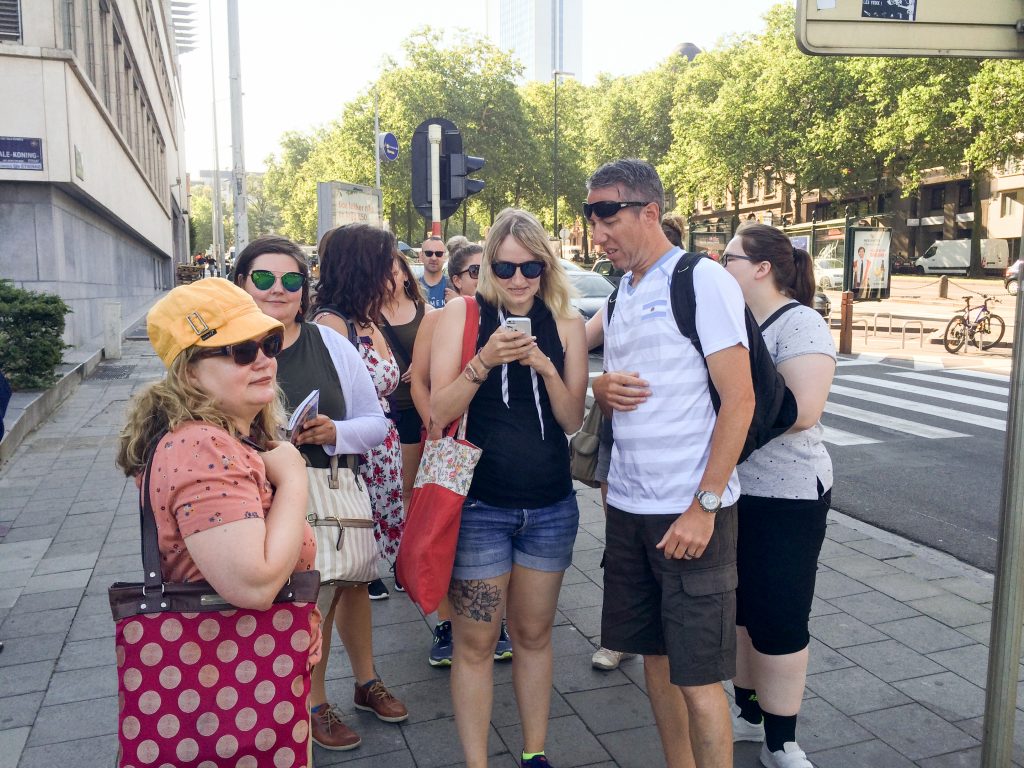 Walking and talking, and at times jointly solving navigational problems, was a big part of the learning experience. Professor Phipps says, “I learned alongside my students as we explored the goals of the course through experiential learning, local visits, and workshops on topics related to social justice and global education. Being in Europe, we spent a lot of time walking and having conversations along our walks. One evening, a student pointed out to me that we had walked over 15 kilometres that day in Brussels. Walking and taking public transit was aligned with the course focus on sustainability and global citizenship education. Importantly, those long walks enabled deep conversations, often sparking a desire to make changes in society. From my perspective, it was refreshing to take learning outside of the classroom, to a new context, and to see the professional and personal growth occurring during the course. I am also filled with hope about the positive changes that the students and teachers will make in their own classrooms.”
Walking and talking, and at times jointly solving navigational problems, was a big part of the learning experience. Professor Phipps says, “I learned alongside my students as we explored the goals of the course through experiential learning, local visits, and workshops on topics related to social justice and global education. Being in Europe, we spent a lot of time walking and having conversations along our walks. One evening, a student pointed out to me that we had walked over 15 kilometres that day in Brussels. Walking and taking public transit was aligned with the course focus on sustainability and global citizenship education. Importantly, those long walks enabled deep conversations, often sparking a desire to make changes in society. From my perspective, it was refreshing to take learning outside of the classroom, to a new context, and to see the professional and personal growth occurring during the course. I am also filled with hope about the positive changes that the students and teachers will make in their own classrooms.”
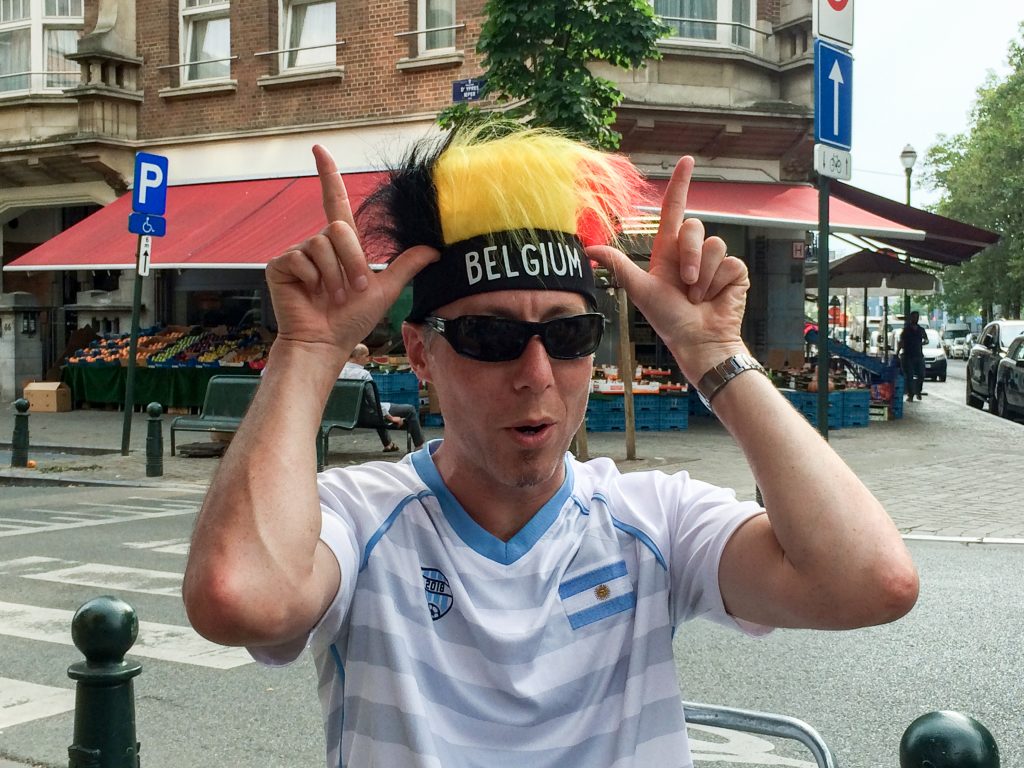 Math teacher and graduate student Mike Stumph, reflecting on his experience and study tours in general, says, “We often hear in Education how concepts and ideas come ‘full circle.’ As a grad student, the pursuit in making connections between theory, practice, and experience is one of the key features of these programs. This course reminded me of the full circles that are continuously happening within my own teaching experiences. For me, this course was different in so many ways. Firstly, it happened in Belgium. Secondly, it required an urgency to understand, to communicate, to question and to listen that is indicative of study tours that lead to impactful learning. I couldn’t help but be reminded of my experiences with Canada World Youth many years ago, traveling and living in South America where my desire to become a teacher began and where the learning was profound. Spending time in Leuven, Belgium, our traveling group and hosts were incredible, adding so much to the experience. We shared ideas on social justice, oppression in education, multicultural viewpoints, immigrant perspectives, and global issues within the classroom.” Erika Baldo, also reflecting on the value of the study tour, says, ” As a student, I look for new opportunities to acquire more knowledge with different people in new environments. As a traveller, I seek out new places to explore and new adventures to embark upon. Finally, as a lifelong learner, I try to push my boundaries to challenge myself. I am thankful that this study tour gave me the opportunity to do all of the above and more. Overall, this was a powerful and rich experience that I will cherish forever.”
Math teacher and graduate student Mike Stumph, reflecting on his experience and study tours in general, says, “We often hear in Education how concepts and ideas come ‘full circle.’ As a grad student, the pursuit in making connections between theory, practice, and experience is one of the key features of these programs. This course reminded me of the full circles that are continuously happening within my own teaching experiences. For me, this course was different in so many ways. Firstly, it happened in Belgium. Secondly, it required an urgency to understand, to communicate, to question and to listen that is indicative of study tours that lead to impactful learning. I couldn’t help but be reminded of my experiences with Canada World Youth many years ago, traveling and living in South America where my desire to become a teacher began and where the learning was profound. Spending time in Leuven, Belgium, our traveling group and hosts were incredible, adding so much to the experience. We shared ideas on social justice, oppression in education, multicultural viewpoints, immigrant perspectives, and global issues within the classroom.” Erika Baldo, also reflecting on the value of the study tour, says, ” As a student, I look for new opportunities to acquire more knowledge with different people in new environments. As a traveller, I seek out new places to explore and new adventures to embark upon. Finally, as a lifelong learner, I try to push my boundaries to challenge myself. I am thankful that this study tour gave me the opportunity to do all of the above and more. Overall, this was a powerful and rich experience that I will cherish forever.”
Students had opportunities to tour the sites, including museums, historic and heritage sites, art galleries, a bell tower, university library, abbeys, local agencies, the Flemish Ministry of Education and Training, and an amazing learning facility called Arts Basics for Children.
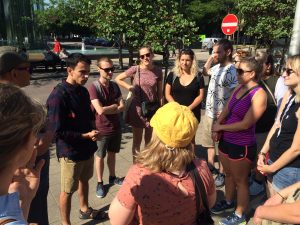 An especially unforgettable experience for many students was the walking tour guided by a medical student who came to Brussels as a refugee at age 16. The group walked the path that a refugee or asylum seeker would take in seeking permission to stay in Belgium, a grueling process involving long line ups and interviews. Teacher Ashley Churko gained insight into “what it is like to be a student when you are a refugee or immigrant,” and has changed some of her classroom practices as a result. She says, “It was very sobering to see the journey that refugees must take once they arrive in Belgium. One of the biggest take-aways from my conversation with our guide was that I need to make more of an effort to value all languages in my classroom. As a French immersion teacher, I tend to value only French. My days are spent constantly reminding students to « parlez en français » and I didn’t appreciate any other language in my classroom. After this class, I have given myself the challenge this year of letting go of that need for full time French, and I have started to let the students use their language of choice during the planning stages of writing. It has made an incredible difference. My students are actually writing better in French because they are organizing their ideas out without worrying about the restriction of language. They are more willing to look up words in the dictionary without complaint or me telling them to do so and take risks with their writing.”
An especially unforgettable experience for many students was the walking tour guided by a medical student who came to Brussels as a refugee at age 16. The group walked the path that a refugee or asylum seeker would take in seeking permission to stay in Belgium, a grueling process involving long line ups and interviews. Teacher Ashley Churko gained insight into “what it is like to be a student when you are a refugee or immigrant,” and has changed some of her classroom practices as a result. She says, “It was very sobering to see the journey that refugees must take once they arrive in Belgium. One of the biggest take-aways from my conversation with our guide was that I need to make more of an effort to value all languages in my classroom. As a French immersion teacher, I tend to value only French. My days are spent constantly reminding students to « parlez en français » and I didn’t appreciate any other language in my classroom. After this class, I have given myself the challenge this year of letting go of that need for full time French, and I have started to let the students use their language of choice during the planning stages of writing. It has made an incredible difference. My students are actually writing better in French because they are organizing their ideas out without worrying about the restriction of language. They are more willing to look up words in the dictionary without complaint or me telling them to do so and take risks with their writing.”
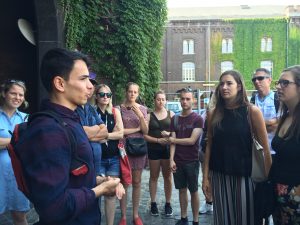 Remembering her experience on the walking tour, undergraduate student Nicole Gebert says, “Before the tour started, I asked the guide “What is this?” I was referring to the rows and rows of sleeping bags occupied by people in the park. He told me they were refugees, waiting. They were people without homes who came for a better future.” As an art student, Nicole was asked by a graduate student to create a piece of art from a quote in the course text. The excerpt, referring to Mark Cocker’s Rivers of Blood, Rivers of Gold (2000), went as follows: “Europe’s conquest of indigenous peoples all over the world was bent on a unilinear but multidimensional project of achieving riches via creating extensive streams of blood, which eventually created and sustained the world order we have today.”
Remembering her experience on the walking tour, undergraduate student Nicole Gebert says, “Before the tour started, I asked the guide “What is this?” I was referring to the rows and rows of sleeping bags occupied by people in the park. He told me they were refugees, waiting. They were people without homes who came for a better future.” As an art student, Nicole was asked by a graduate student to create a piece of art from a quote in the course text. The excerpt, referring to Mark Cocker’s Rivers of Blood, Rivers of Gold (2000), went as follows: “Europe’s conquest of indigenous peoples all over the world was bent on a unilinear but multidimensional project of achieving riches via creating extensive streams of blood, which eventually created and sustained the world order we have today.”
Nicole created the following piece:
In explanation for her art, Nicole wrote in her travel journal: “As one steps into society on a daily basis one is bombarded with hate and racism. Whether they experience it for themselves or see it happen right before their eyes it is evident that people stand on uneven grounds… Hence the curtains. Perhaps this is a show to some people or a form of entertainment to see who is better than the other. Battles are fought, people are hurt, the pain flows like a subtle stream where no one seems to notice or care about its impact. The bump in the roads are represented by rocks, the broken bridge is the broken connection to humanity itself. But wait… There is hope. There is a glimmer of light in the sky of lost languages and memories trying to break through the walls of society. Perhaps it is such that we need to break free and gain a rather different perspective on who we are as a nation. Break the stereotypes, and repair society.”
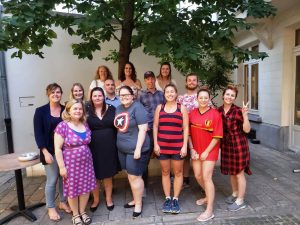 Grad students contextualized their learning by their professional employment. Teacher Ashley Churko has incorporated into her classes a new discussion method, learned in the Philosophy for Children workshop during the summer institute: She says, “An idea I took away was the red, orange, and green papers for discussions. It is such a great way to entice all students to participate in a discussion, even if they are not speaking. Since September, I have used this system so much, that anytime I say ‘discussion,’ my students automatically take out their papers, even without me saying so. I love it so much because I know the opinions of my students who barely say a word in class because they show their opinions. It has been a great way to encourage participation without forcing everyone to speak.” Teacher Erika Baldo says, “I found the session on Philosophy for Children to be particularly interesting and relevant. As a teacher, I search for creative and innovative ways to engage in critical thought, challenge perceptions, and enlighten the minds of my students.”
Grad students contextualized their learning by their professional employment. Teacher Ashley Churko has incorporated into her classes a new discussion method, learned in the Philosophy for Children workshop during the summer institute: She says, “An idea I took away was the red, orange, and green papers for discussions. It is such a great way to entice all students to participate in a discussion, even if they are not speaking. Since September, I have used this system so much, that anytime I say ‘discussion,’ my students automatically take out their papers, even without me saying so. I love it so much because I know the opinions of my students who barely say a word in class because they show their opinions. It has been a great way to encourage participation without forcing everyone to speak.” Teacher Erika Baldo says, “I found the session on Philosophy for Children to be particularly interesting and relevant. As a teacher, I search for creative and innovative ways to engage in critical thought, challenge perceptions, and enlighten the minds of my students.”
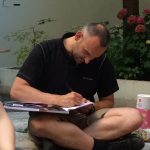 Deni Miclea, who works as a Student Success Analyst for Treaty 4 Education Alliance, had another perspective to offer on the learning in the course. He says, “I learned that Belgium has a complex education system that is governed by national, regional, and local authorities. In Belgium, students learn in the country’s three official languages: Flemish, French, and German. Each language group promotes their unique language and culture while meeting similar Educational outcomes. In Canada, there is an increasing need to cooperate between Provincial and First Nations educational authorities to shape our curricula. It is important to promote Indigenous language and culture instruction in schools.”
Deni Miclea, who works as a Student Success Analyst for Treaty 4 Education Alliance, had another perspective to offer on the learning in the course. He says, “I learned that Belgium has a complex education system that is governed by national, regional, and local authorities. In Belgium, students learn in the country’s three official languages: Flemish, French, and German. Each language group promotes their unique language and culture while meeting similar Educational outcomes. In Canada, there is an increasing need to cooperate between Provincial and First Nations educational authorities to shape our curricula. It is important to promote Indigenous language and culture instruction in schools.”
Mike Stumph says, “So what does a senior secondary mathematics teacher do with an experience such as this? The simple answer is; be a better teacher. The complete answer is to weave the ideas from this experience, along with further readings of Paulo Freire, Marilyn Frankenstein, Eric Gutstein, Andrew Brantlinger, Ole Skovsmose and others, into a pedagogy that is inclusive, flexible, decolonizing, empowering and emancipatory. Many of my colleagues argue that mathematics is neutral, its universality and bias-free perspective is how every class should be taught. Mathematics is a human endeavour, complete with bias, perspective, purpose, and influence. It can be used to build or destroy systems of oppression as well as empower or disenfranchise citizens. The role the teacher plays is a crucial one.”
Mike is looking forward to applying his learning in his Spanish classes, too. He says, “I’m hoping to bring the world into my classroom, relying heavily upon my interactions with Spanish speakers and experiences living in Mexico and Uruguay. I feel ready for the language component but I will also be working hard to include the concepts brought forward from this tremendously valuable study tour. My gratitude cannot be understated to the organizers and participants who pushed me to see and understand more.”
Another ongoing effect of the study tour is the community that formed through travelling and learning together. On one of the final evenings of the tour, the group sat late into the night on the terrace of a youth hostel in Brussels, chatting about their experiences, discussing global citizenship issues, and telling life stories. Their level of enjoyment was evident to others: another guest at the youth hostel asked if they were having a family reunion. Going through this experience together, walking, talking, getting lost, and sharing food and stories, formed family-like bonds, but also a professional learning community. Even now that the students are back in Canada and working in their separate environments, the conversations continue.
By Shuana Niessen
Follow us on social media